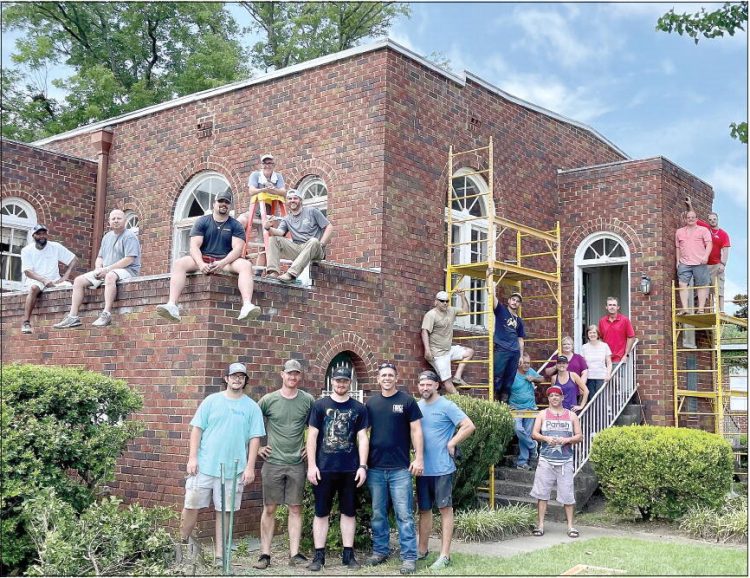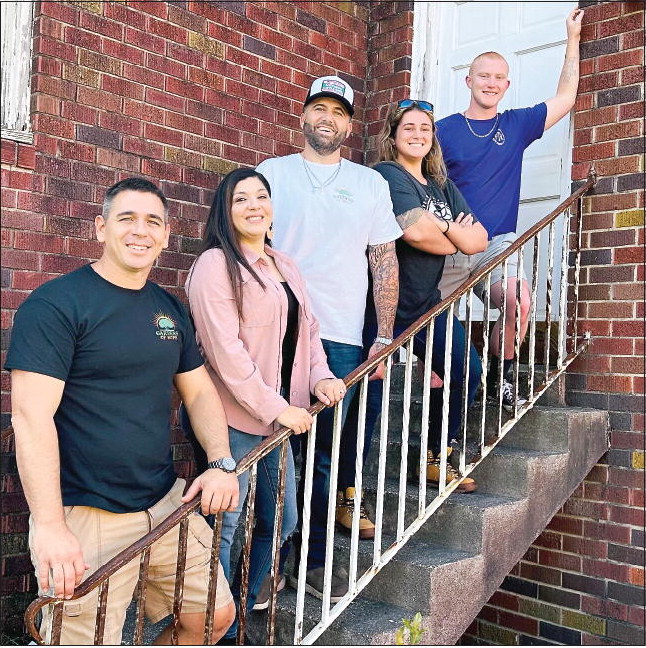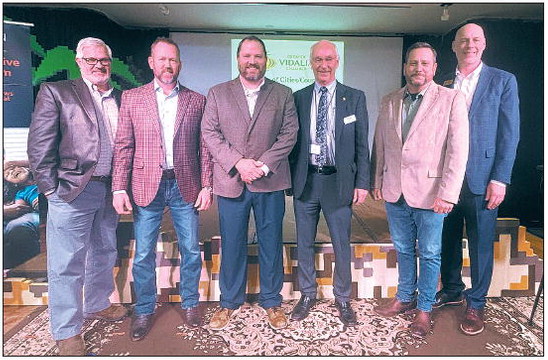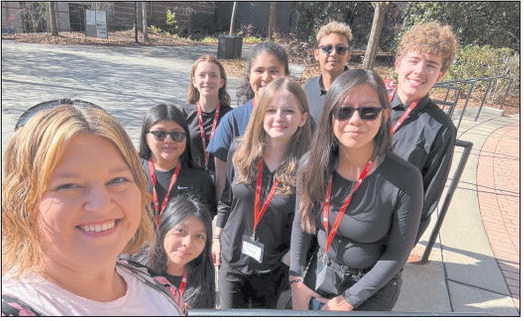Gardens of Hope Continues to Grow in Toombs County


mrandolphadvance@gmail.com
The Gardens of Hope Recovery Community Organization (RCO) is continuing to grow throughout Toombs County. The group has sprouted a partnership with the historic Lyons Garden Club and is preparing for an upcoming fundraiser to further its mission.
Gardens of Hope is an addiction recovery support center located at 145 SW Broad Street in Lyons. Though often confused with Toombs County Prevention, Treatment, and Recovery (PTR) because the two organizations previously shared a facility in Vidalia, the organization is a separate entity. RCO serves as a nonclinical resource hub to connect individuals struggling with substance use disorder and their families to necessary facilities and services.
“It is the starting point in our community for any individual that is looking to take their next steps into recovery,” Gardens of Hope Director Craig George commented. “I almost think of it as an immediate care walk-in facility. Of course, all of our services are free and grant funded, but this is a place where someone can walk in these doors and be met with someone who is in long-term recovery, who is willing to partner with them for their next steps.”
This sort of facility is much needed in the community, according to George, who has overcome substance use disorder himself. “When I came into recovery, and when [Gardens of Hope Administrative Assistant] Amy [Cruz] was seeking services for her son [who also struggled with substance abuse], we didn’t know where to begin, what to do, or who to contact,” George explained. “Here, we’ll help them determine what their next step is. Maybe it’s detoxing, and if so, we’ll transport them and get them a bed at detox. Maybe it’s finding a treatment center like Forge or the Hope House. We send people all over the state. We help them get there, and we’ll transport them there. Maybe, it’s outpatient, [or] maybe it’s PTR. Well, then they can come here and be directed toward the appropriate resource.”
He continued, “Through this process, everything is self-directed care. I’m not telling you what you need to do; you’re telling me what you want to do and I’m helping you to accomplish that. I’m not your solution-finder; this is just a safe place to recover and hang out with other people in recovery.”
Recovery support meetings are held three times a day — morning, noon, and afternoon — throughout the day at the Gardens of Hope Clubhouse, which is located at 145 SW Broad Street in Lyons. Through these meetings, and the fellowship often shared within the building, recovery is cultivated, as an atmosphere of understanding is created.
“By being able to be supported by someone who comes from that same place and has lived that experience, there’s no greater impact I witness than becoming a part of the recovery community and walking alongside people who understand where you’ve been,” George emphasized. “That’s the ‘secret sauce’ here. The ultimate weapon for an individual seeking recovery is a person in long-term recovery.”
He added, “I’ve been there; I’ve experienced the same type of thing in my life, and that was instrumental. I came to a lot of places and I was prayed over, sent to counselors, and spent almost 20 years seeking some form of solution, but until I actually joined forces with the individuals who had walked this path, I never really found what I was looking for. For some reason, I may have heard the same thing, but it really depended on who was the messenger. For me, it had to be someone who knew what it was like to really be enslaved to a substance and for it to control your life.”
According to both George and Cruz, this understanding knocks down walls that individuals struggling with substance use disorder and families may have. Cruz shared her experience working as a certified peer specialist for parents. “A lot of our peers feel safe in the judgment-free zone that we’ve created,” she remarked. “I cannot tell you how many parents come in here and say, ‘Well, I’m kind of looking for…’ and relax when I say, ‘Look, my son is in recovery — I know the battle and I know the struggle.’ They always take a deep breath and tell me what they really want to say.”
She continued, “They don’t have to feel like they have to tiptoe around the subject. They know they can be real when I tell them, ‘Been there, done that,’ and they can truly ask what they want without any judgment.”
In her work with parents of those struggling with substance use disorder, Cruz works not only to try to repair the parents’ child, but to support the parents in whatever they need. “I’m there to be a support to [the parents] for whatever they feel their next step is. I provide them with resources, and I focus on if they have the support and mental health they need to get through this,” she clarified. “Really, what [the recovery peers] do is what I do, except I do it with the parents because the parents are also going through their own recovery journey. It is hard mentally, emotionally, and every other way.”
“It’s definitely a process. It’s healing for the entire family,” George added. “Being able to have someone for our loved ones to be able to connect to is so awesome, and we are able to provide that in this space.”
Currently, the organization is not only working with those struggling with substance use disorder or in recovery, and those individuals’ families, but the group is also launching programs to reach both youth and the incarcerated to help connect them to valuable resources. There are two certified peer specialists for youth — both under the age of 22 — who are preparing to go into school systems and speak with at-risk teenagers in hopes of helping them avoid the dangerous path of substance use disorder.
Recent Forge graduate and Gardens of Hope employee Jimbo Partin is working to launch a program in the county jail. He is helping individuals create plans to connect them with the recovery community so that upon their reintegration into society, they have the tools they need to continue to recover. George assists in the effort, as both he and Partin have spent time within the Georgia Department of Corrections and have since become forensic peer mentors.
“Now, recovery services are truly the primary focus of the judicial system as a whole,” he said. “Rather than incarceration, we are looking at the ability to rehabilitate and to put people in a place where they actually can succeed and find a way out. So, instead of locking them up and throwing away the key, now, the opportunity to find treatment and seek those services is really the go-to for the Middle Judicial Circuit.”
George said that the RCO’s 5-person staff reaches a wide swath of the population, and allows the group to have someone that relates to everyone. “We all complement each other well with our certificates and our various backgrounds. It makes us a diverse bunch, and we’ve really been able to reach pretty far with that diversity,” George emphasized. “It’s really what makes this organization work.”
Recently, the organization has grown, after receiving two grants — $250,000 from the state government and a $5,000 AgSouth grant for their upcoming collaboration with the historic Lyons Garden Club.
“It has been such an amazing journey, and we have an opportunity now to move things forward into this next stage of development. As an organization, we are at a place where we have just been picked up by the state, and put into the state’s budget,” George remarked.
According to George, the organization was able to first begin from funding received from Leigh-Anne White & Co. and Toombs County PTR. The initial grant was for 4 years. In the first year of the organization’s existence, representatives from the Department of Behavioral Health and Developmental Disabilities asked the group to apply for a $250,000 grant that would allow funding through the state’s budget. The grant was awarded, and beginning last month, Gardens of Hope RCO was funded as an autonomous organization contracted under the Department. This funding is now used for salaries, operations, and more of the organization.
“It’s really unbelievable that in year one, something like this would happen, but it’s because of the work of this staff. This is an amazing team — they’re gogetters, and everyone has seen them in the community. It’s not some big pony show, they’re out there in the community really making an impact and changing lives,” George reflected. “[This grant] gave us the opportunity to really, really impact our community in a much greater way by having our own space, including our own clubhouse and some additional staff. Also, with Toombs County PTR, it’s freed up some funds that were specific to the development of this organization where we can reallocate those funds and impact some of our other programs in a major way.”
Upon moving into their own space and settling into their current clubhouse, Gardens of Hope turned its focus back to the original priority: revitalizing the historic Lyons Garden Club clubhouse. “Our attention shifted years back, because ultimately, the first project we were on was the Lyons Garden Club partnership. Before there was ever anything — before there were any funds — there was an agreement between their organization and our organization that we would work hard to restore that beautiful building, and they would give us access to use it. So, we’re back at that vision and dream,” George explained.
The Lyons Garden Club moved into the structure located at 126 East Liberty Avenue in 1965, after the building had housed multiple women’s organizations whose focus was to stand for civic pride and better their community. The building, which hosted both a campaign for literacy in the 1930s and a radio broadcast from the basement in 1947, is currently listed on the National Registry of Historic Places, and serves as an iconic representation of the history of Lyons.
As participation in the Garden Club has dwindled over the past few years, so has upkeep on the clubhouse, necessitating several repairs and renovations. Previously, Gardens of Hope held a work day where members focused on some of the most pertinent issues of the clubhouse, and the group plans to continue its work in the coming days.
In exchange for work on the Clubhouse, the Garden Club has agreed to come alongside Gardens of Hope in its recovery efforts. The downstairs area of the Lyons Garden Club facility will be used for offices, and the upstairs area will be a space for meetings and seminars. In addition to this, the group will help cultivate hope among those struggling with substance use disorder through a therapy garden. Recently, AgSouth presented Gardens of Hope with a $5,000 grant for this garden, which has been named the CommUNITY Garden. There, the Garden Club and Gardens of Hope will grow vegetables to donate to local food banks.
“I think it is really an awesome opportunity for us to partner with the Ly-
RENOVATING THE GARDEN CLUB BUILDING – Members of the Gardens of Hope organization have been working to renovate and restore the historic Lyons Garden Club building. continued from page
ons Garden Club and to bring growth to their organization as well, while also tapping into our area’s agricultural roots,” George emphasized.
Yet, even with the recently received grants, more funding is needed for the Lyons Garden Club project; thus, to help with these costs, Gardens of Hope is hosting a fundraising gala at 6 p.m. on Saturday, February 24. The event is themed around “The Secret Garden” concept, and will feature dinner, live music, and a silent auction.
George said the event will be a great way not only to contribute to the cause, but to learn more about the organization, as he shared that recent conversation around substance use disorder had shifted within the area.
“I’m really proud of this community and how it has transformed its approach and perspective on addiction. It has changed so much over the last few years,” George remarked. “We’ve watched this community transform in how it responds to those in addiction or recovery, and how it responds to us and our message. We’ve looked for every opportunity we can find to stand on every platform to talk about recovery. By doing so, we’ve seen walls come down.”
Cruz added, “The more people are speaking out about recovery and recovering out loud, the more people are coming into treatment, the more people are seeking services because it is no longer taboo. Where it was once a thing of shame, now recovering is an accomplishment. You can have your head lifted high about making it through or fighting the battle. It makes people want to be a part of that fight and be proud of it.”
Tickets for the gala are on sale for $75 each, or for $500 per table of eight, and may be purchased at the Clubhouse, or by contacting (912) 454-1953 or (912) 388-2206. For more information on Gardens of Hope RCO, or other ways to donate, visit the organization’s Facebook page.






